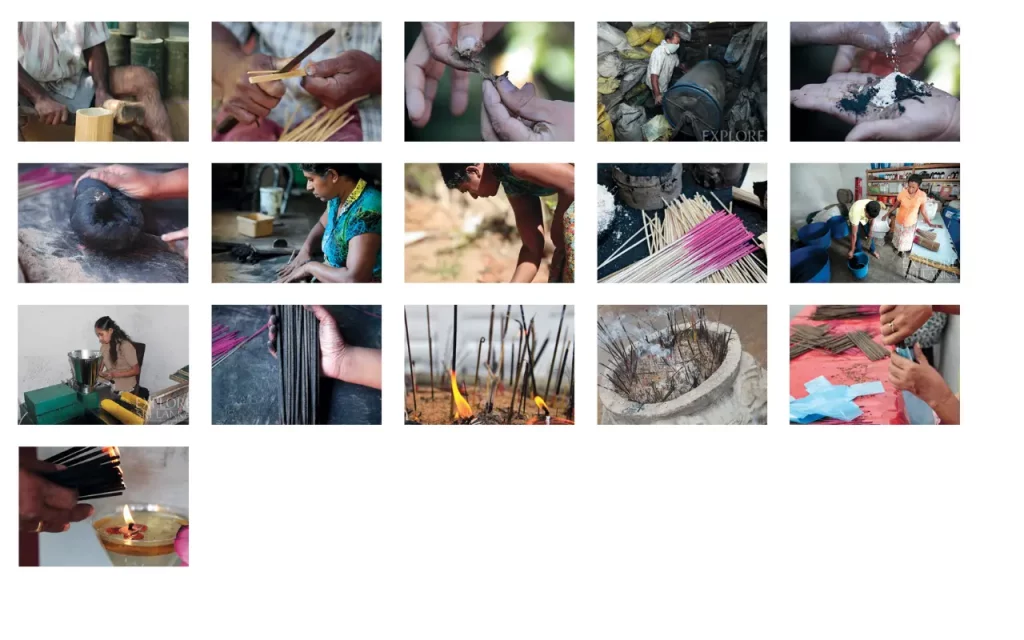
Incense leaves the soul spellbound while calming the senses. Its fragrance instantly springs to mind our encounters with spirituality. It’s the kind of refreshment that fills the heart with boundless placidity. However, little do we know of the rustic passion that goes into its making.
Words Sonali Kadurugamuwa Photographs Indika de Silva and Hansani Bandara
Taking it all in
Permeating through the thick foliage, a soothing fragrance of cosy familiarity wafted towards us. We trusted its company as we would, the sweet aromas of home and thus followed the quaint trail to where incense sticks (handunkuru) were being crafted in their thousands.
We meandered along gravel footpaths some travelling amidst work-in-progress others around pockets of lush nutmeg and many other spice trees. Workers carried on diligently, under the shade of makeshift work stations; rolling a dry gooey paste onto thin, sturdy sticks, coating them generously.
Dust From Milled Powders Rose Up Like Wild, Wind-Swept Hair, While Below Bamboo Logs Were Being Stripped Into Sticks…
Dust from milled powders rose up like wild, wind-swept hair, while below bamboo logs were being stripped into countless sticks… The sounds were numerous, yet chatter was seldom heard. Bubbling pots of dye over firewood hearths received quick, regular dips from the ends of sticks, for colour; prepping for a flaunting presentation…
From star ingredients to fragrant incense
Finely powdered wood, ash, and bombu tree bark are churned together in a mixer adding water, forming a thick yet dry, black, pasty glue. And thereby reults the foundation to a resilient marriage of raw materials, soon to bring life to the core component of what makes handunkuru our beloved incense sticks.
The sticks have their own size-based identities, respectively caked from the slender ‘original’, which may burn for up to an hour; to the fondly named, slightly overweight ‘little giant’ that burns for two hours tops; and the chunkiest of them all, ‘smart giant’ with close to four hours of burning time, according to Sumeda Elpitiya, the Proprietor.
Handmade, from the heart of a little village in Kandy, run by a man, his wife and their extended family, under the keen supervision of Elpitiya, the rush of getting the job done was definitely felt, while the morning sun baked the freshly made handunkuru before being packed off to Colombo. At Elpitiya’s store, a few finishing touches — bathed in perfumed essential oils… rose, jasmine, sandalwood, iris, lily, marigold, araliya, lavender and more, then packaged for sale under the brand ‘Thai Sumeda’. “And the name?” we ask…
And so the story goes…
Over a few stocks of handunkuru, which sat far apart from the rest, which Elpitiya explains are made from naturally fragrant botanicals; sandalwood, sambrani, vishnukanthri, savandara, agil, suanda kottumba, devadara, he trails off to further charm our hearts with a warm cup of his anecdote…
Handunkuru made here tells a 25 year old tale of a young gentleman. On his visits to Thailand, he meets a monk who gives him the idea to startup a handunkuru business, not just any in the incense trade, but rather one that would be unlike any other…
Handunkuru Made Here Tells A 25 Year Old Tale That Originates From A Visit To Thailand
We follow along as he relates his saga unfold on his return to Sri Lanka, with this ‘idea’. He manages to research the art of crafting quality incense sticks and frequents little shops in the local market promoting his very own self-made handunkuru. Time and true grit were all it took before many of the shop vendors began requesting for more of his products. Sumeda Elpitiya’s efforts were finally starting to pay off.
Meanwhile, a few years thereafter, in Kandy, another determined young man, Wickramaratne, paced the street by his village communication booth, awaiting a long anticipated phone call from Elpitiya.He had spotted a local ad on Elpitiya’s business off a piece of newspaper wrapping and wanted to be a part of it, since his wife had experience in the trade.
Over two decades to this day, the humble fragrance of burning incense hovers over the maker’s home, as we witness diligence and modesty unfold. Alongside Elipitiya’s guidance, Wickramaratne and his folks work tirelessly in producing handunkuru for Thai Sumeda. The name he says, “‘Thai’… dedicated to the birth place of an exceptional idea.”
Thai Sumeda Enterprises
401/7 Kotte Road, Pita Kotte
Tel: (+94 11) 282 4087



